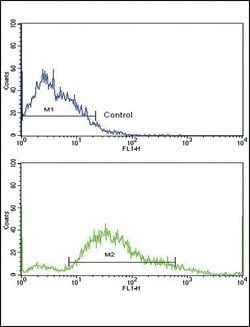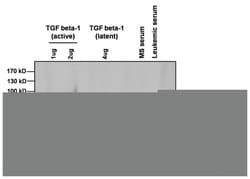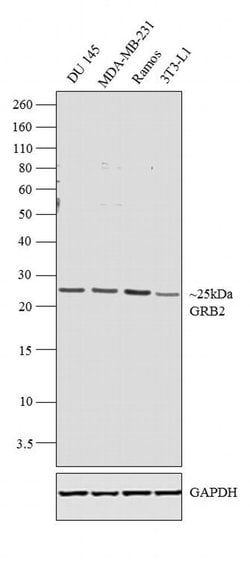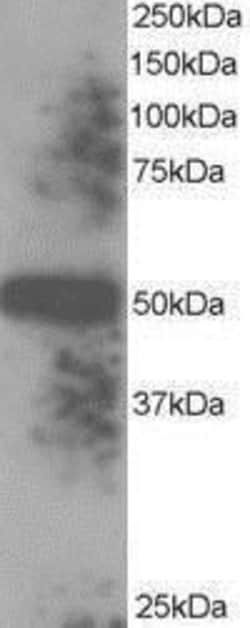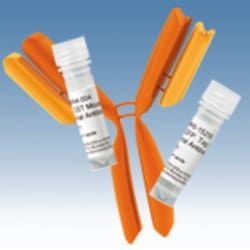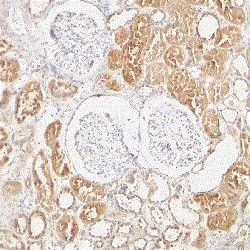VEGF Polyclonal Antibody, Invitrogen™
Manufacturer: Thermo Scientific
Select a Size
| Pack Size | SKU | Availability | Price |
|---|---|---|---|
| Each of 1 | PIPA184331-Each-of-1 | In Stock | ₹ 52,777.00 |
PIPA184331 - Each of 1
In Stock
Quantity
1
Base Price: ₹ 52,777.00
GST (18%): ₹ 9,499.86
Total Price: ₹ 62,276.86
Antigen
VEGF
Classification
Polyclonal
Conjugate
Unconjugated
Gene
VEGFA
Gene Alias
angiogenic factor; etID309976.16; eVEGF120; eVEGF164; human VEGF121 homolog; MGC70609; MVCD1; ovine vascular endothelial growth factor; RP1-261G23.1; unnamed protein product; VAS; vascular endothelial growth factor; vascular endothelial growth factor (VEGF) precursor; vascular endothelial growth factor 121 isoform; vascular endothelial growth factor 164; vascular endothelial growth factor 165b; vascular endothelial growth factor 182; vascular endothelial growth factor 182 isoform; vascular endothelial growth factor 188; vascular endothelial growth factor 188 isoform; vascular endothelial growth factor 189; vascular endothelial growth factor A; vascular endothelial growth factor A121; vascular endothelial growth factor A165; vascular endothelial growth factor Aa; Vascular endothelial growth factor A-A; vascular endothelial growth factor isoform 165; vascular permeability factor; Vasculotropin; VEGF; VEGF1; VEGF164; VEGF182; VEGF188; vegfa; VEGF-A; VEGFA165b; vegfaa; VEGF-A-A; VEGFMGC70609; VPF; VPF ant; wu:fj82c06
Host Species
Goat
Purification Method
Affinity chromatography
Regulatory Status
RUO
Gene ID (Entrez)
7422
Content And Storage
-20°C
Form
Lyophilized
Applications
ELISA, Functional Assay, Immunohistochemistry (Paraffin), Western Blot
Concentration
1 mg/mL
Formulation
PBS with no preservative; pH 7.4
Gene Accession No.
P15692
Gene Symbols
VEGFA
Immunogen
Recombinant human VEGF
Quantity
100 μg
Primary or Secondary
Primary
Target Species
Human
Product Type
Antibody
Isotype
IgG
Description
- Reconstitute with 0.1 mL of distilled water
- Prior to reconstitution, store at 4oC
- After reconstitution, store undiluted at -20oC, avoiding freeze/thaw cycles
- This antibody may be used in Western Blotting applications under either reducing or non-reducing conditions
- Goat anti Human VEGF antibody recognizes human VEGF (vascular endothelial growth factor), a heparin-binding cytokine and member of the PDGF/VEGF growth factor family, which exists as several splice variants of the VEGF gene
- VEGF (vascular endothelial growth factor) which is a 45 kDa homodimeric, disulfide-linked glycoprotein involved in angiogenesis which promotes tumor progression and metastasis
- VEGF has a variety of effects on vascular endothelium, including the ability to promote endothelial cell viability, mitogenesis, chemotaxis, and vascular permeability
- The VEGF family currently includes VEGF-A, VEGF-B, VEGF-C, VEGF-D, VEGF-E, and PIGF
- VEGF and its receptor system have been shown to be the fundamental regulators in the cell signaling of angiogenesis
- Most tumors have the absolute requirement of angiogenesis, and VEGF has been described as the most potent angiogenic cytokine linked to this process
- To date 5 different isoforms of VEGF have been described
- These isoforms are generated as the result of alternative splicing from a single VEGF gene
- These various isoforms have been shown to bind to two tyrosine-kinase receptors flt-1 (VEGFR-1) and flk-1/KDR (VEGFR-2), which have been found to be expressed almost exclusively on endothelial cells
- VEGF and its high-affinity binding receptors, the tyrosine kinases FLK1 and FLT1, are thought to be important for the development of embryonic vasculature
- Studies have shown that an alternately spliced form of FLT1 produces a soluble protein, termed sFLT1, which binds vascular endothelial growth factor with high affinity, playing an inhibitory role in angiogenesis
- Elevated levels of VEGF is linked to POEMS syndrome (Polyneuropathy, Organomegaly, Endocrinopathy, Monoclonal gammopathy, Skin changes) also known as Crow-Fukase syndrome which affects multiple organs in the body.
